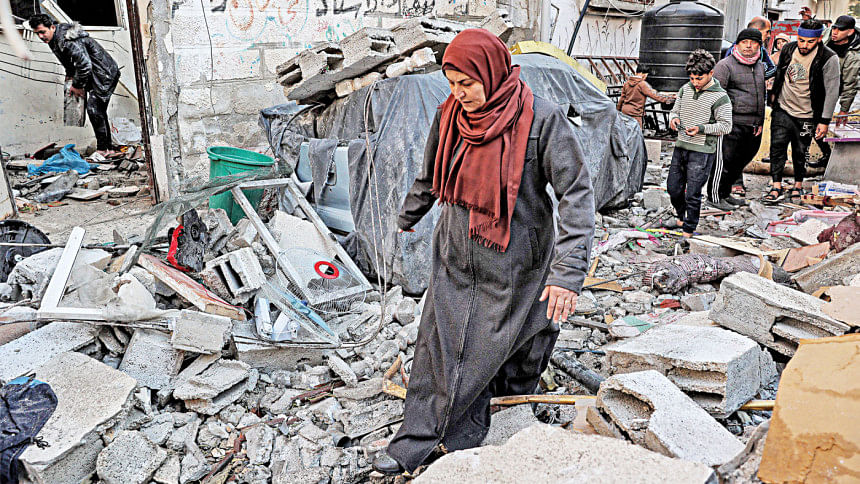Israeli forces intensify strikes on Rafah
Israeli forces yesterday bombed areas in the southern border city of Rafah where more than half of Gaza’s population is sheltering, as Prime Minister Benjamin Netanyahu rejected a proposal to end offensive in the Palestinian enclave.
Netanyahu said later on Wednesday terms proposed by Hamas for a ceasefire that would also involve releasing hostages held by the Palestinian group were “delusional” and vowed to fight on, saying victory was in reach and just months away.
The rejection followed intense diplomacy to end the four-and-a-half-month conflict before a threatened Israeli assault on Rafah, which is now home to over a million people, many of them in makeshift tents and lacking food and medicine.
Aid agencies have warned of a humanitarian catastrophe if Israel follows through on its threat to enter one of the last remaining areas of the Gaza Strip that its troops have not moved into during its ground offensive.
UN Secretary General Antonio Guterres said on Wednesday that pushing into Rafah on the border with Egypt would “increase what is already a humanitarian nightmare with untold regional consequences.”
- Netanyahu rejects proposal to end offensive
- Hamas delegation in Cairo for ceasefire talks
- Death toll in enclave now 27,840
Israel says it takes steps to avoid civilian casualties and accuses Hamas of hiding among civilians, including at school shelters and hospitals, leading to more civilian deaths. Hamas has denied this.
Israeli planes bombed areas in Rafah yesterday morning, residents said, killing at least 14 civilians, including five children, in strikes on houses. Tanks also shelled some areas in eastern Rafah, intensifying the residents’ fears of an imminent ground assault.
“We have our backs to the (border) fence and faces toward the Mediterranean. Where should we go?” said Emad, 55, a displaced person who is a father of six.
Despite Israel’s rejection of the Hamas proposal, more talks are planned and US Secretary of State Antony Blinken, on his fifth trip to the region since the start of the offensive, said he saw room for further negotiation, reports Reuters.
In a late-night press conference in a Tel Aviv hotel on Wednesday, Blinken said elements of the proposal put forward by Hamas had contained clear “non-starters”, without saying what they were.
“But we also see space in what came back to pursue negotiations, to see if we can get to an agreement. That’s what we intend to do,” he said.
A Hamas delegation led by senior official Khalil Al-Hayya arrived in Cairo yesterday for ceasefire talks with Egypt and Qatar, the mediators in the latest diplomatic push.
In its latest update, Gaza’s health ministry said yesterday at least 27,840 Palestinians have been confirmed killed, and more than 67,000 injured, with thousands more feared buried under rubble in Israel’s offensive.
The Israeli bombardment also continued in Khan Younis and Deir-Al-Balah in central Gaza overnight, killing a Palestinian television journalist, Nafez Abdel-Jawwad, and his son.
Speaking in Nicosia, Egyptian Foreign Minister Sameh Shoukry said Egypt was working with all stakeholders to find a solution to end the conflict and urged the international community to apply more pressure to allow aid into Gaza.
“The human suffering in Gaza is unthinkable, and a humanitarian support system on the verge of collapsing, and the threats of a dangerous expansion of the conflict are real and unfolding,” he told reporters.
Jordan’s King Abdullah has also embarked on a diplomatic mission aimed at ending the Israeli offensive, visiting Western capitals in a tour that will include a meeting with US President Joe Biden.
LondonGBDESK//



Comments are closed.